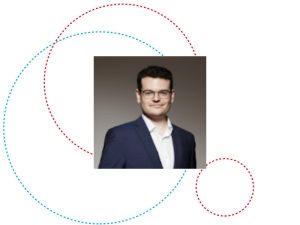Prof. Christian Fisch joined SnT on 1 February 2022 as Head of the new Entrepreneurship, Innovation, and New Technology (EINT) research group. Over the course of his career, Prof. Fisch has taught courses in undergraduate, graduate, and MBA programs at public and private universities in the Netherlands, Luxembourg, and Germany, where he won several teaching awards.
We spoke to him to discover more about his research interests and his life so far as a professor and researcher. His research focuses on a variety of topics in entrepreneurship and innovation management, such as the financing, growth, success, and failure of start-up companies, digital transformation, sustainable entrepreneurship, and space entrepreneurship, as well as intellectual property, sustainable innovation, and innovation in the space sector.
Welcome to SnT! Could you tell us about your background and how you came to research entrepreneurship and innovation?
Thank you. My research interest always lied at the intersection of innovation and entrepreneurship. After my studies in business administration, I went on to do a Ph.D. in innovation management, which examined why companies file patents, trademarks, and more. It was there that I became interested in intellectual property rights, especially in connection with start-up companies.
Later, during my post-doctoral studies at Trier University, I focused on the area of entrepreneurial finance, especially on established funding mechanisms for start-up companies, for example business angel finance and venture capital. But I also looked at new and emerging funding avenues, such as blockchain-based funding mechanisms like initial coin offerings (ICOs) or – now – NFTs.
What is your favourite career highlight so far?
I published an article in 2019 looking at the funding of blockchain companies, including initial coin offerings. This article is my favourite career highlight for several reasons: I worked on it by myself, so it was not part of a group submission, rather something I did completely on my own, which was very rewarding. It was published in the Journal of Business Venturing, one of the most prestigious journals on entrepreneurship, and it was awarded the “Research Newcomer Award” by the German Association of Business Administration Scholars among a large number of research publications across all subfields of business administration. It also received a large number of citations thus far.
Another highlight I am fond of was a study of entrepreneurial personalities conducted via language analysis. We analysed the personalities of superstar entrepreneurs and managers, such as Elon Musk. This article went on to be cited in more than 100 press outlets worldwide, so it received a lot of attention from the general public. It really showed me how the press handles research results.
What are you looking to achieve through your work?
My research is typically quantitative, empirical, interdisciplinary, and I like to deal with new datasets and employ new forms of analysis, such as those based on big data and machine learning, but also facial recognition, for example. Overall, my goal is to conduct impactful research, and achieve results that are useful for practitioners and policymakers, and that others can build on in the scholarly community. For example, in addition to being cited by other articles in the scientific community, my article on the funding of blockchain companies has also been cited by the European Union in some of their documents, which shows that policymakers took note of it.
On a personal level, I like to interact with young scholars, show them how to conduct research, and hopefully help them become great researchers, which would in turn translate back to the local economy. And I like teaching – I will be holding classes on space business and space entrepreneurship for the students of the Interdisciplinary Space Master (ISM), and I am very much looking forward to that.
What is the most rewarding thing about being a professor?
The fact that I can pursue my intellectual curiosity. I am interested in a lot of topics in management research, and the good thing about entrepreneurship and innovation research is that they deal, by definition, with creativity in business administration. Due to the nature of the topics, there are not many boundaries, and coming up with research questions that are interesting and relevant, among near-endless possibilities, and then explore them, is very rewarding.
What kind of projects will you be setting your sights on?
One of my main research areas will continue to be entrepreneurial finance, exploring topics such as how startups are financed, what are the new trends, how do new technologies influence funding of new companies, and so on. Another thing that I will be setting my sights on is space entrepreneurship. I will already be teaching space business and space entrepreneurship at the ISM, but I also want to conduct new research on space business, which involves entrepreneurship and innovation. One of the first projects that I want to work on is drafting a map of the space ecosystem in Luxembourg, to understand its strengths and how it can be improved. Within the space entrepreneurship field, a potential cross section would be exploring the funding of space companies. These topics have plenty of potential to create impact in Luxembourg but also in the scientific community, as space entrepreneurship is a relatively new phenomenon.
